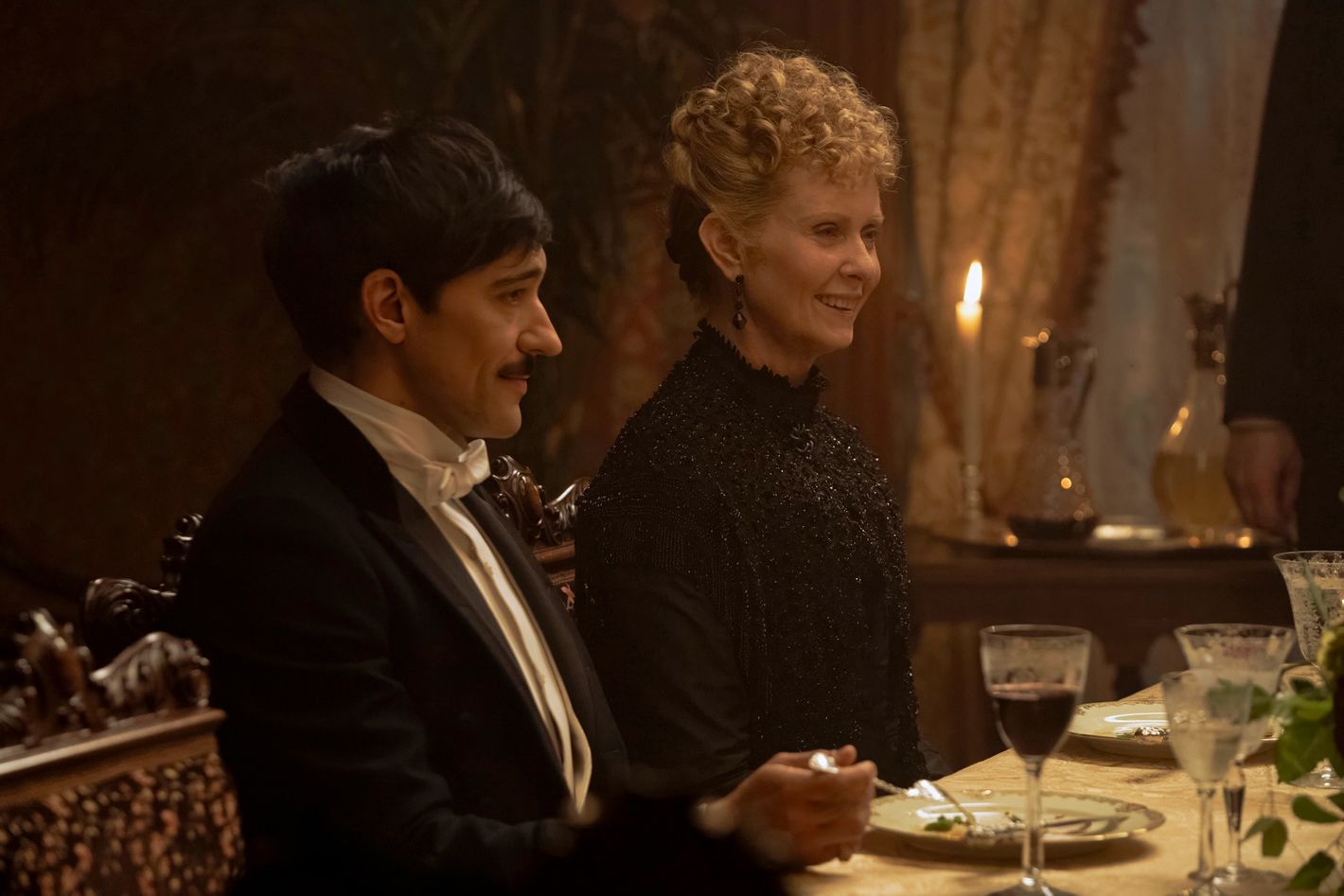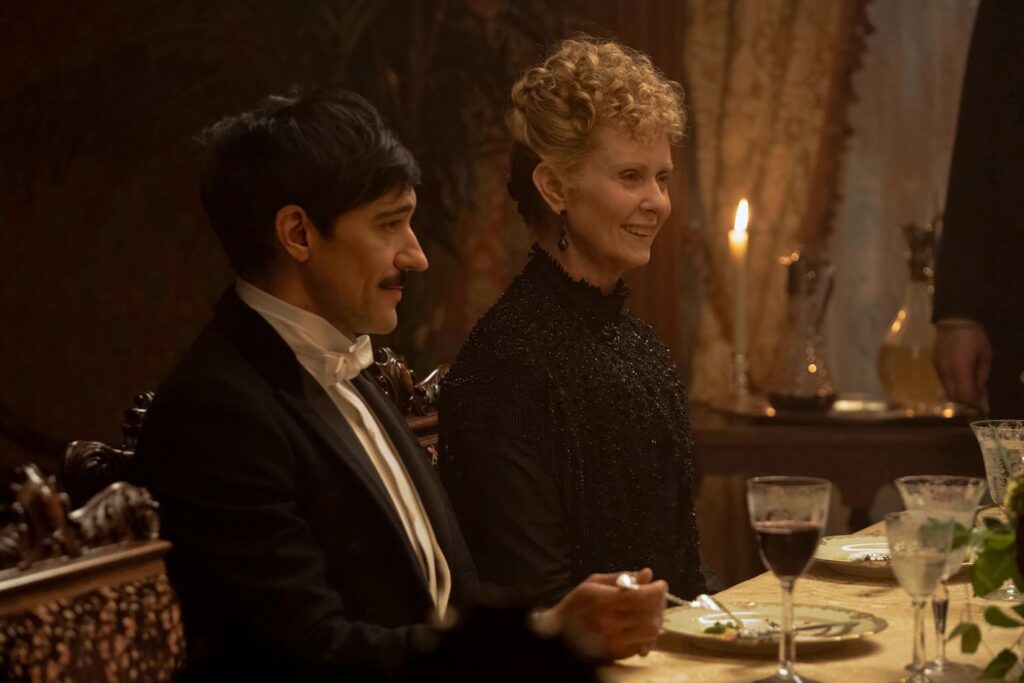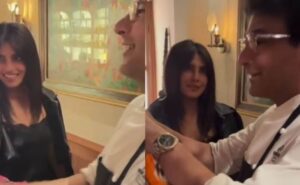
This summer, Cynthia Nixon is the queen of HBO Max. The NYC-based actress is starring in two of the network-slash-streamer’s biggest series of the summer, And Just Like That… and The Gilded Age. Despite the approximately 150 years between them, the series have much in common as frothy looks at the lives of New York City’s well-dressed elite. But Nixon’s characters in particular could not be more different. A far cry from relatably messy but sharp and adventurous Miranda Hobbes, Ada Forte (née Brook) is often quiet as a church mouse, sweet and naive, and spends most of her life sequestered in her well-appointed drawing room. In season two, Ada finally found a soulmate to get her out from under the thumb of her sister Agnes (Christine Baranski), only for him to die of cancer. In the season three premiere, Ada’s back by Agnes’s side, this time as a wealthy widow at the helm of their household after her nephew Oscar squandered the van Rhijn fortune. And what is she doing with this newfound power and position? Getting really into the Temperance movement, of course.
While Nixon thinks the character is “misguided” in her political pursuits, she has to hand it to her: Who knew, way back in season one, that sweet Aunt Ada had what it took to be, in Nixon’s words, “a petty tyrant?” In the stately yet silly world of The Gilded Age, that’s what we call growth.
You just finished the And Just Like That… press tour, and now you’ve moved straight to The Gilded Age, plus you’ve been at the No Kings protest, and campaigning for Zohran. How’s it going?
It’s an incredibly hectic time. I’m just doing fundraising 24 hours a day. It’s been really crazy.
I saw that great “Don’t Rank Cuomo” PSA you did with Ashlie Atkinson, who plays Mrs. Fish on The Gilded Age. How did that come together?
I am the president of Ashlie’s fan club. Ashlie and I sat next to each other for two very long days at a very long fashion show during the first Sex and the City movie, in which she had a kind of a sizable role, most of which, because it was extraneously expository, ended up on the cutting room floor. We became fast friends. When I played sort of an alcoholic auteur director that was perhaps a murderer in Law & Order: SVU, she played my stage manager. When I directed the play Steve, she was the one woman in it; it was a cast of gay men plus Ashlie. I didn’t have to do anything with Michael Patrick to get her cast in And Just Like That…, but I was a person who was very strongly pushing for her on The Gilded Age behind the scenes. Our politics are right on target with each other, and we are often involved in supporting each other and our political endeavors. Even though Ashlie and I are great friends, I wasn’t even the person who thought of her for it. Former Assemblywoman Yuh-Line Niou was like, “How about Ashlie? She’s so funny.” And I was like, “Great idea.”
It’s funny that you’re both so involved with these causes while immersing yourselves in a show about the age of old money and robber barons.
The cast of The Gilded Age is a very politically informed and involved bunch. Denée joined me in a hunger strike in November of 2023 to bring attention to the bombardment of Gaza. Morgan Spector and I are DSA folks, and we’re often finding each other at the same events. Carrie Coon is very outspoken. Christine Baranski participated with me in a Please Stop Bombing Gaza video that I did with prominent women for Mother’s Day, imploring Jill Biden to use her voice and her influence. So we are in this show all about robber barons and income inequality and the fight for African-Americans, the fight for immigrants, the fight for women to receive equal treatment and equal opportunity, and some of us play very conservative people, but we are quite left-wing.
And your character this season is getting quite politically active in her own way.
In her own perhaps misguided way, yes.
Why do you think Ada is drawn to the Temperance movement?
Kind of like Nora in A Doll’s House, Ada is very much a child-woman. She is a person who has a tremendous heart and is not unintelligent by any stretch of the imagination. But she has so little experience of the world, and of being in charge even of herself, much less anyone else. She has spent her life very protected and very sheltered. Now all of a sudden, she is a woman of means, and she is in charge of an entire household of people, including a not inconsiderable household staff. From her sheltered position, Ada sees the world in terms of virtue, and she sees the dangers of drink. Temperance was quite a feminist cause at the time. It was largely a women’s movement. It revolved around the idea that men would go out and get drunk, and they would spend all the money on liquor, and there was no money left for feeding or housing their children and wives. They would also become very violent when drunk and would beat their wives and their children. When you think about it in those terms, you think, Well, how could anyone be against temperance? It’s all about virtue, right? And conquering evil.
Agnes understands that the world is not about good and evil and virtue and sin. The world is about power and who wields it and who has it and who is denied it. So what Agnes would say to that argument about the problems of alcohol is that these women’s problem is not so much that they have husbands who drink; it’s that they don’t have the vote, and they don’t have any access to money and power. Not to give too much away, but this season for Ada is very much about learning more about the real world and how it works. She thinks that because she’s sweet and a friend to her servants, they are going to of course want to do anything she asks. She goes through a little bit of being a petty tyrant, albeit for virtue. Ada goes around from servant to servant, from relative to relative, and with her little winning smile says, “Wouldn’t you like to sign the Temperance Pledge?” She will eventually understand that if she’s going to pursue political causes, she has to find one that the people in her sphere can actually get on board with.
Ada’s arc has been one of growing independence in baby steps: getting married, having the means to stand up to her sister. How has it been to play that dynamic shift with Christine this season?
They’ve always been at odds. They have a very sisterly relationship, and they also have an alpha-beta relationship. There’s always been a struggle, but Ada has understood that she didn’t have any power, and she’s been prudent about the best way to get around Agnes: to bide her time, to go around her back, to nudge but not confront. Now the wheel has turned and Ada is up on top, and Agnes is a very formidable critic. She’s like the opposition party that does not like being out of power and will spend all of her time pricking holes in the balloon that is Ada’s plans. A lot of it is comedic, delightfully so, but as we see as they clash more and more, it does have a dramatic and a painful side to it too. If you are the boss now, says Agnes, then who am I? What’s my place? Am I just an invisible woman, then? That’s the real fear, and that’s where so much of the fighting comes from. It’s not so much “Your ideas are stupid, Ada,” but “What’s my place?”
This season, you were filming And Just Like That… and The Gilded Age simultaneously. Going back and forth between the two, how did you stay connected to the character of Ada?
I’ve always felt connected to Ada, frankly. That’s the weird and ironic thing. The world thinks I’m Miranda, but by the time I started playing Miranda, I had been acting for 20 years and I had a specialty in characters very much like Ada: shy, hopeful, optimistic people who were basically wearing a sign that said, “please don’t hurt me.”
I think it is a virtue that the characters are so different. What I found really hard was submerging myself in their worlds. When you’re doing a play that you rehearse for a month or more, you really have time to find the character, but also find the scenes. When you’re doing film or television, by going every day to set and being with these characters and discovering the scenes, you really get immersed. It becomes your world. It’s very hard, though, to keep pulling yourself out of that world, and trying to submerge yourself in a very different world. When I was a kid — acting with Christine Baranski, actually — I did these two different shows at the same time. Again, the characters were kind of opposites. One was a waif and one was a baller. But the thing was, I knew what the scenes were. Whereas this is, Oh my God, here’s a new script. I have to learn these roles and I have to discover these scenes. The hard part was having the headspace to discover them when yesterday you were trying to discover something with an entirely different character in an entirely different world. There’s so little rehearsal in film and television. There’s almost none. You just have to show up and just clink yourself into the slot, and it becomes an automatic thing. It’s very compact and it’s very immersive.
Within the first few minutes of the new season, Ada delivers a speech admitting that there were times after her husband’s death that she prayed to not wake up. It’s very emotionally frank for this character, especially because of her usual surface of sweetness and etiquette.
Ada has had a deep sadness in her life for as long as she’s been alive. She’s had a sadness that her life has been effectively empty until she met the man who would become her husband. She was a woman who would’ve loved to have had a full life and children, and she never had any of that, and she never had a place in the world. She also understood that she was living on her sister’s charity. When you’re living on someone else’s goodwill, if you have a brain in your head, you understand that you have an obligation to be a person that’s pleasant to have around. She very much has that uppermost in her mind. It’s her default setting not to complain, and not to show her sadness, and not to show her loneliness, but it’s very important for the actor, for me, to always make sure that it’s buried there somewhat.
I found that really hard to do when Miranda was the opposite of that. Not just the opposite temperamentally, in terms of she’s confident, she’s cynical, she’s very modern, she’s empowered, but also she’s just off to the races. She’s like, “I’m single. There’s all these women to date. Who am I?” It might be frustrating to try and figure out how to find these women, but the world is her oyster. As opposed to, Ada had found a happiness that she had never dreamed of, and then it was in a moment taken from her and smashed, in a way she knows she will never find again or maybe even want to look for again. Miranda is so full of possibility and adventure and what’s going to come next, and Ada is trying so hard to be that way and to fill the deep well of her sadness and her loneliness and her bereavement with things like the Temperance movement. But it’s very much about putting on a brave face when she just wants to not wake up in the morning.
We spoke about Ashlie and Christine earlier, and I’m wondering if there’s anyone else you’ve worked with in theater before who makes The Gilded Age feel like a cast reunion.
Christine Baranski and I did this play The Real Thing in 1984, but also Simon Jones was a replacement very early on, right there with us 40 years ago. Deborah Monk and I were in a production together when I was college age. Nathan Lane I’ve known forever, Donna Murphy I’ve known forever. Kelli O’Hara and I knew each other a little bit, and now we know each other a lot more. Bill Irwin, who was Ada’s not-so-well-meaning suitor in season one, he and I are old friends, and Celia Keenan-Bolger, and Kristine Nielsen. It’s completely Old Home Week.
But the real treat for me was meeting all these young people who are so extraordinary. I know all the people I’ve mentioned are going to be amazing, but these young people! I knew Denée and of course had seen her work, but they have found more young people who are every bit our equal and more. That was the part that I was not particularly expecting, and it takes my breath away every time.
Julian Fellowes told Vulture, “my fantasy is always that the audience runs and looks things up on Wikipedia and then reads books about it.” Has anything in the show sparked a new obsession or Wikipedia rabbit hole for you?
The idea that a woman was so instrumental in building the Brooklyn Bridge was great news to me. When the show was about to start, we all read a lot of books, both fiction and nonfiction, and I guess I knew something about this world largely from Edith Wharton and Henry James. But the thing that really captured my imagination is the incredibly intricate rules of etiquette regarding who you’re allowed to speak to, who you’re not allowed to speak to, who you’re allowed to call on, how you must never cut anyone you’ve been introduced to, necessitating that you must not be introduced to people, because once you’ve been introduced, then you are a sitting duck for them, and they might not be a person you approve of. It is as complicated as a Japanese tea ceremony. All of the rules about how people in general, but most particularly women, interacted with each other and all of the rules that you mustn’t break or bend.
The Gilded Age is so interesting because some elements feel modern, while others seem way older and more foreign than only a century and a half ago.
So many of the issues that are being faced by all the different characters in all the different strata and worlds are just so much along the continuum and exactly what we’re dealing with right now in 2025. But for better or worse, mostly for better, we don’t have quite the level of rules and restrictions, and as we’ll see later, the things that a woman can have done to her that makes her a persona non grata — not even anything that she herself did, but something that was done to her.
Related
“This season is very much her learning more about the real world and how it works.”

































































